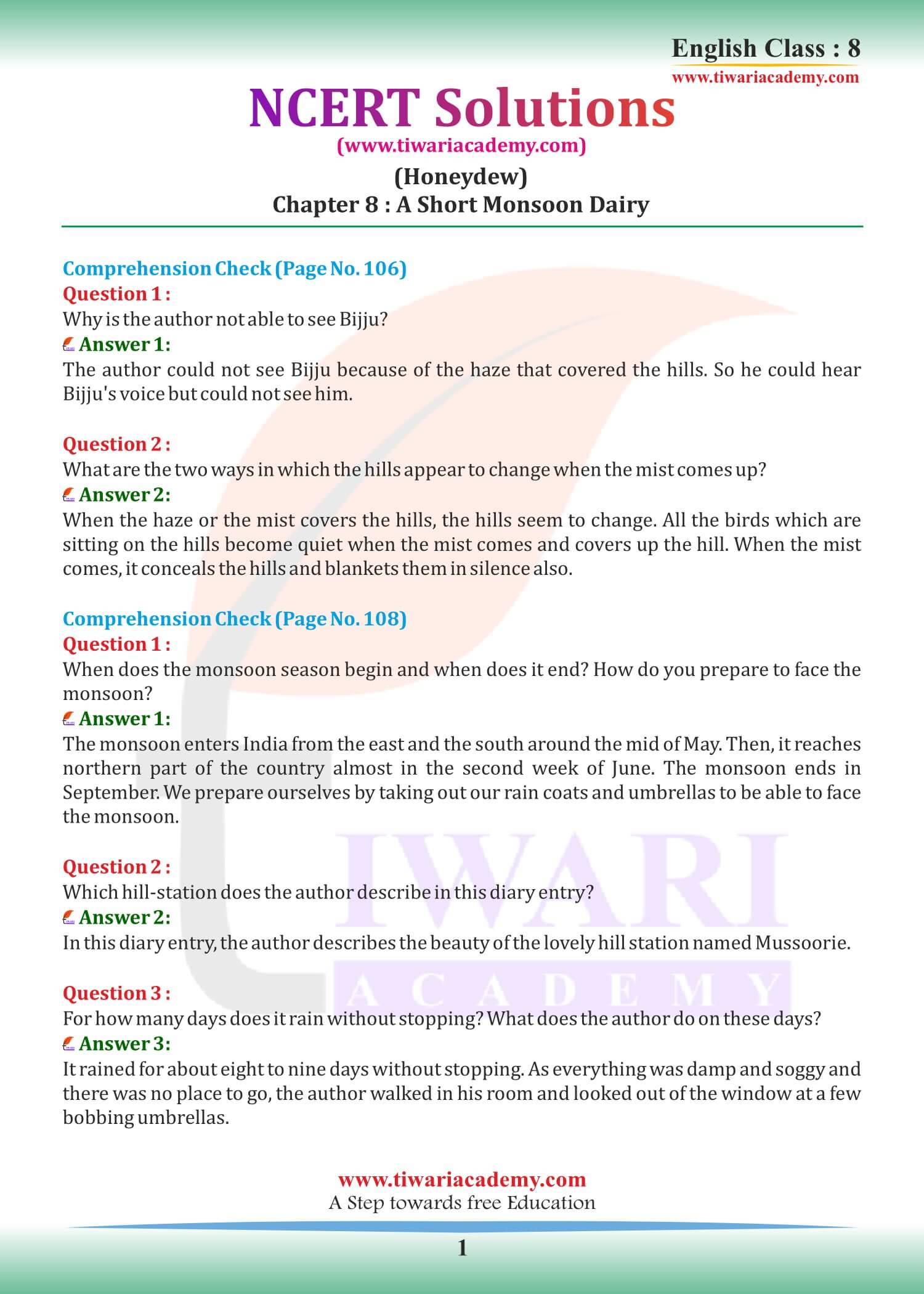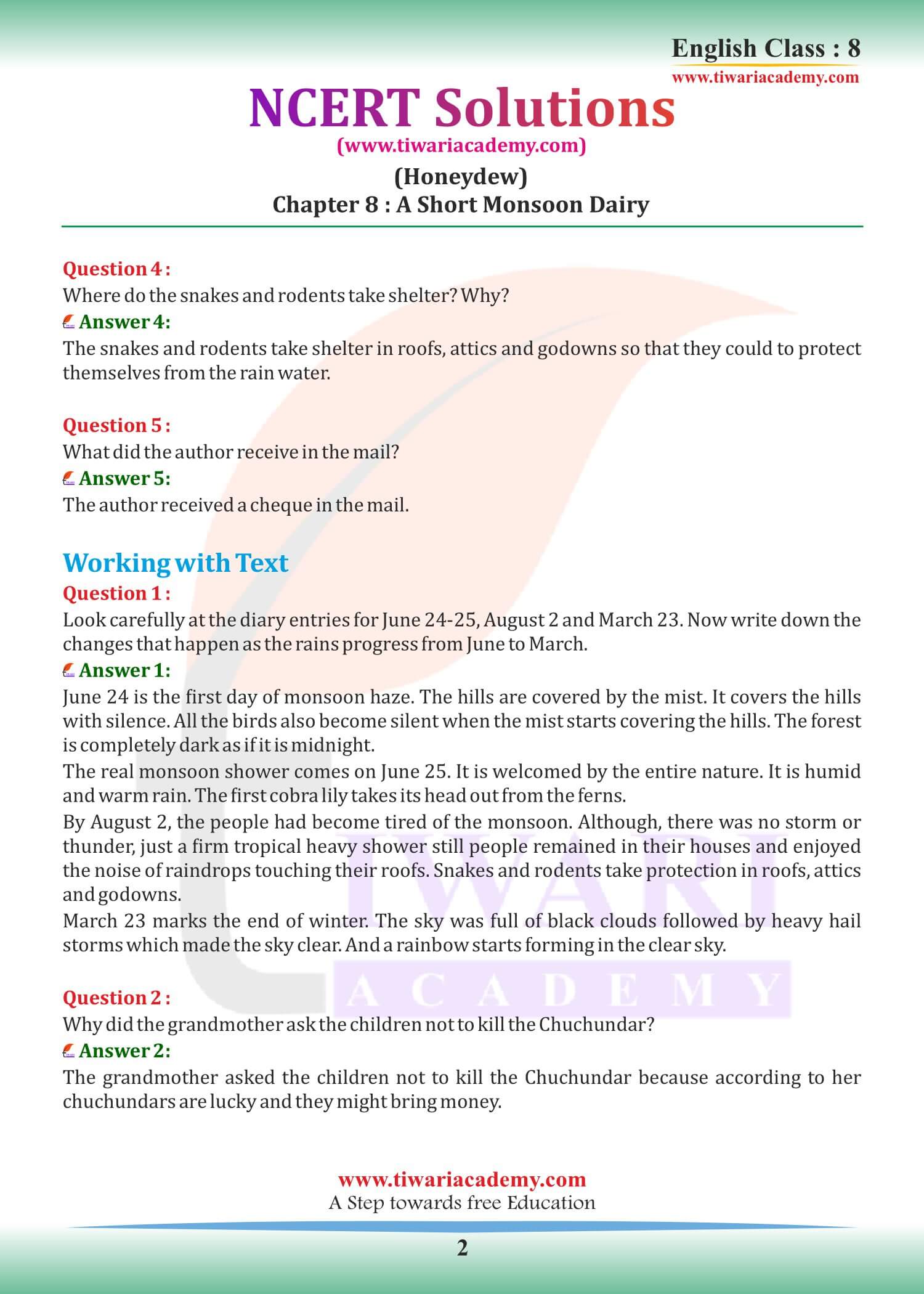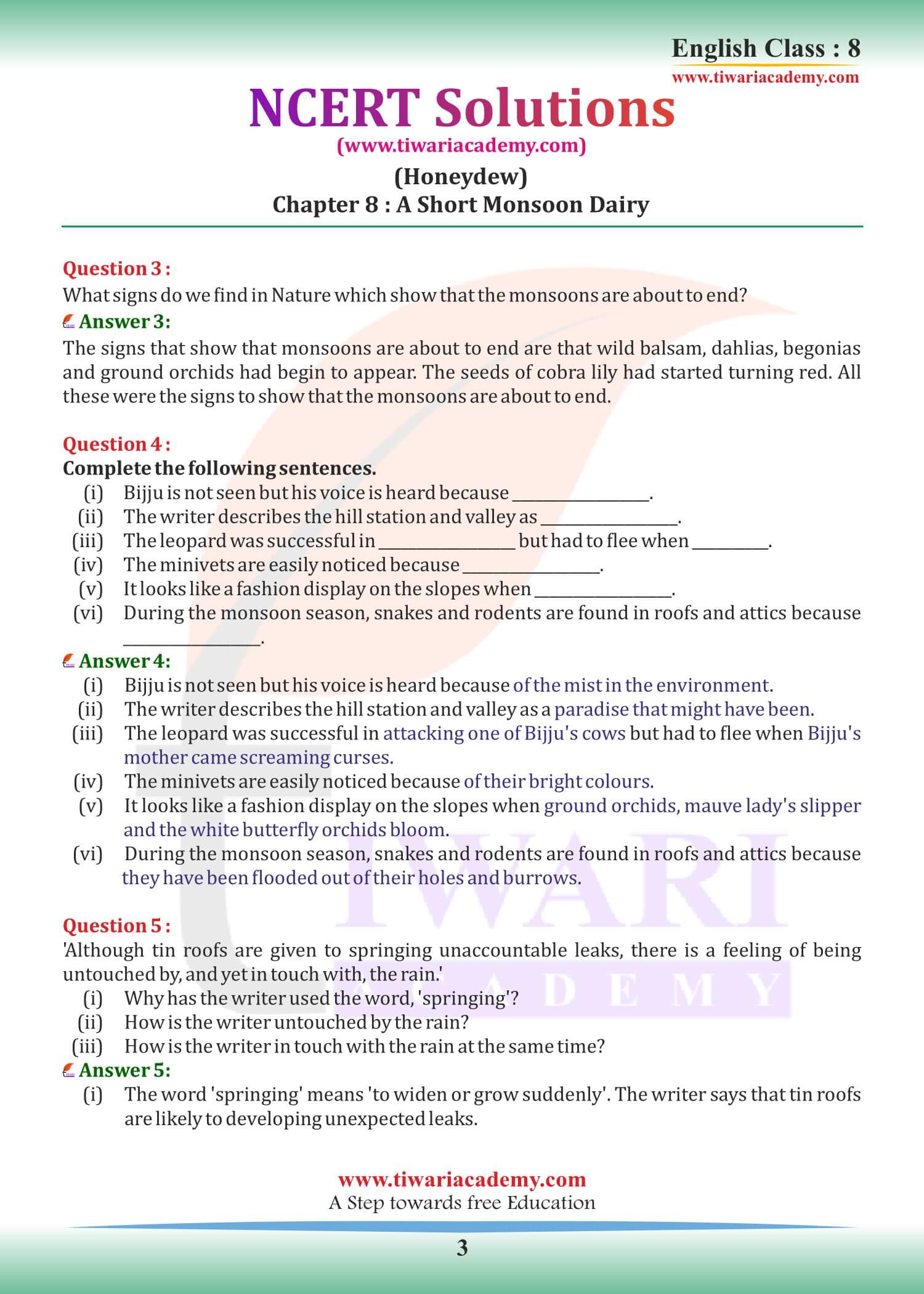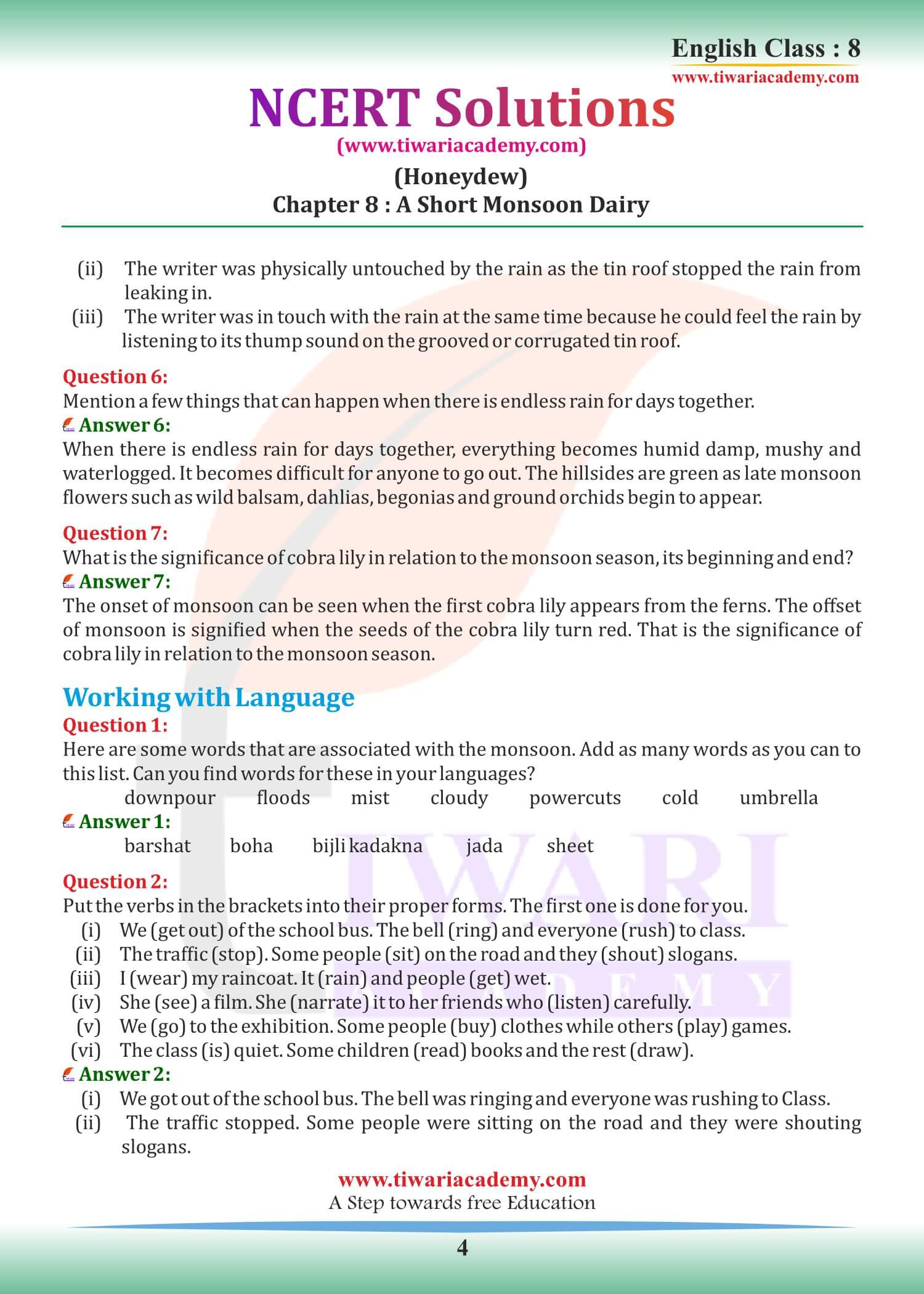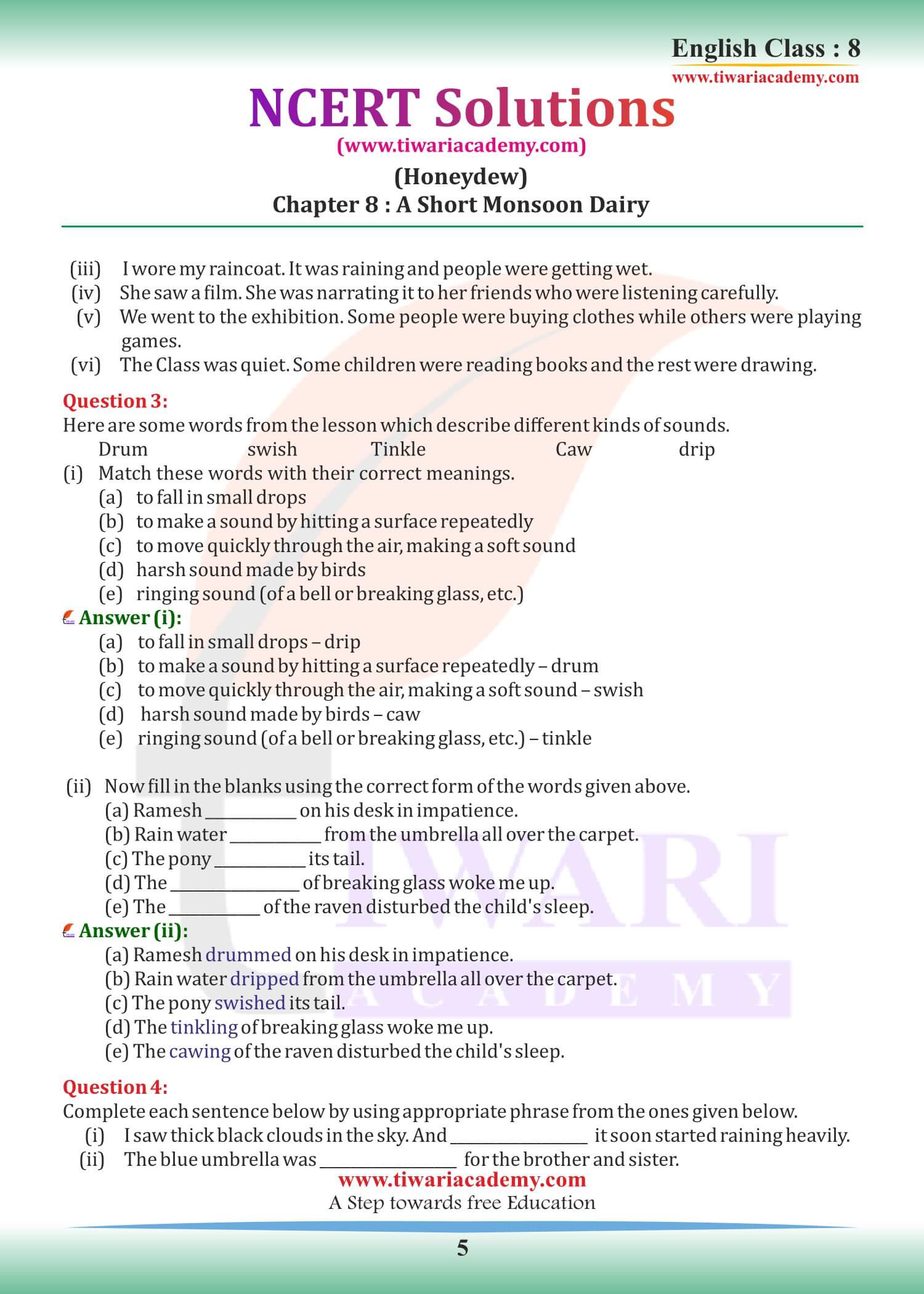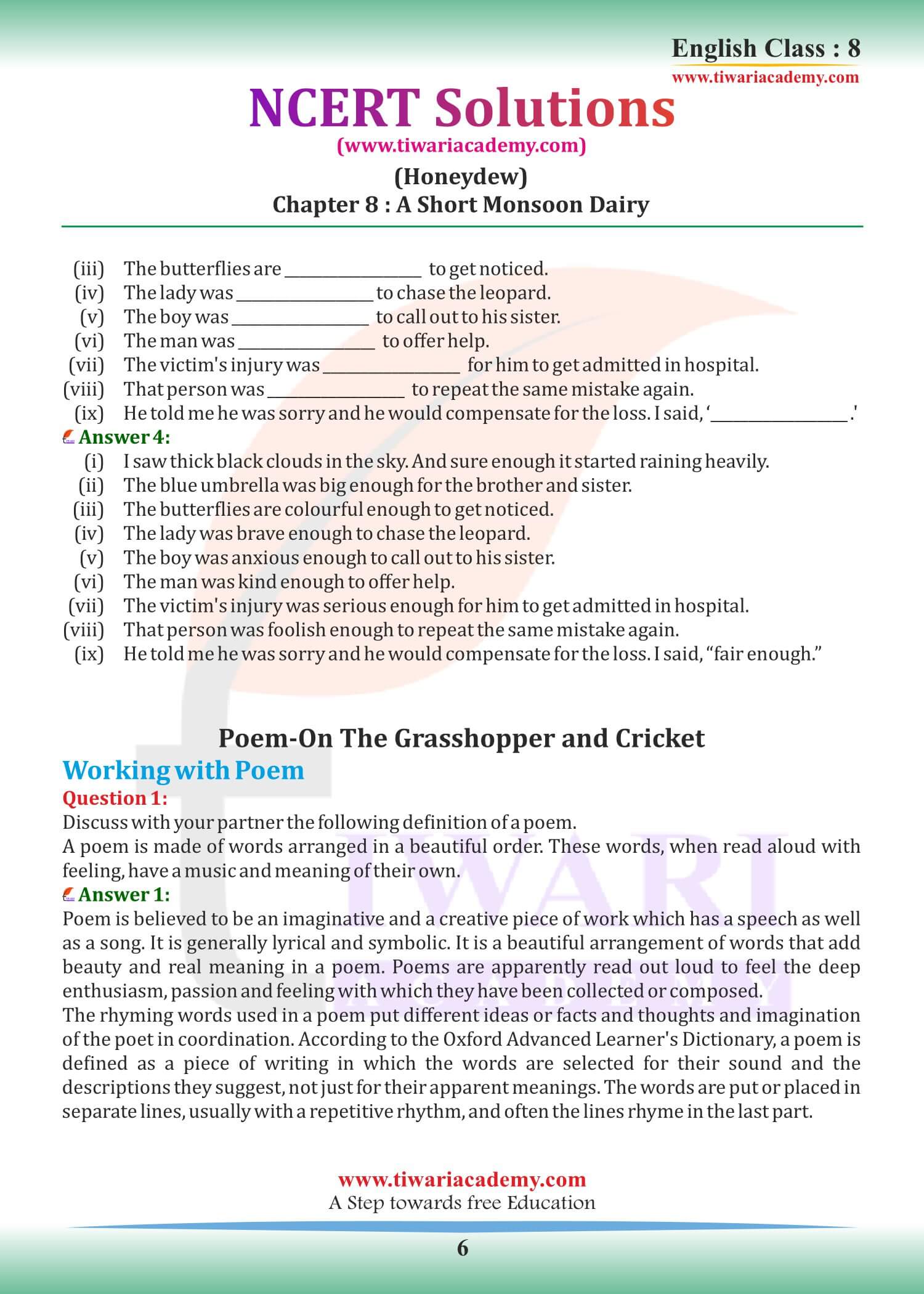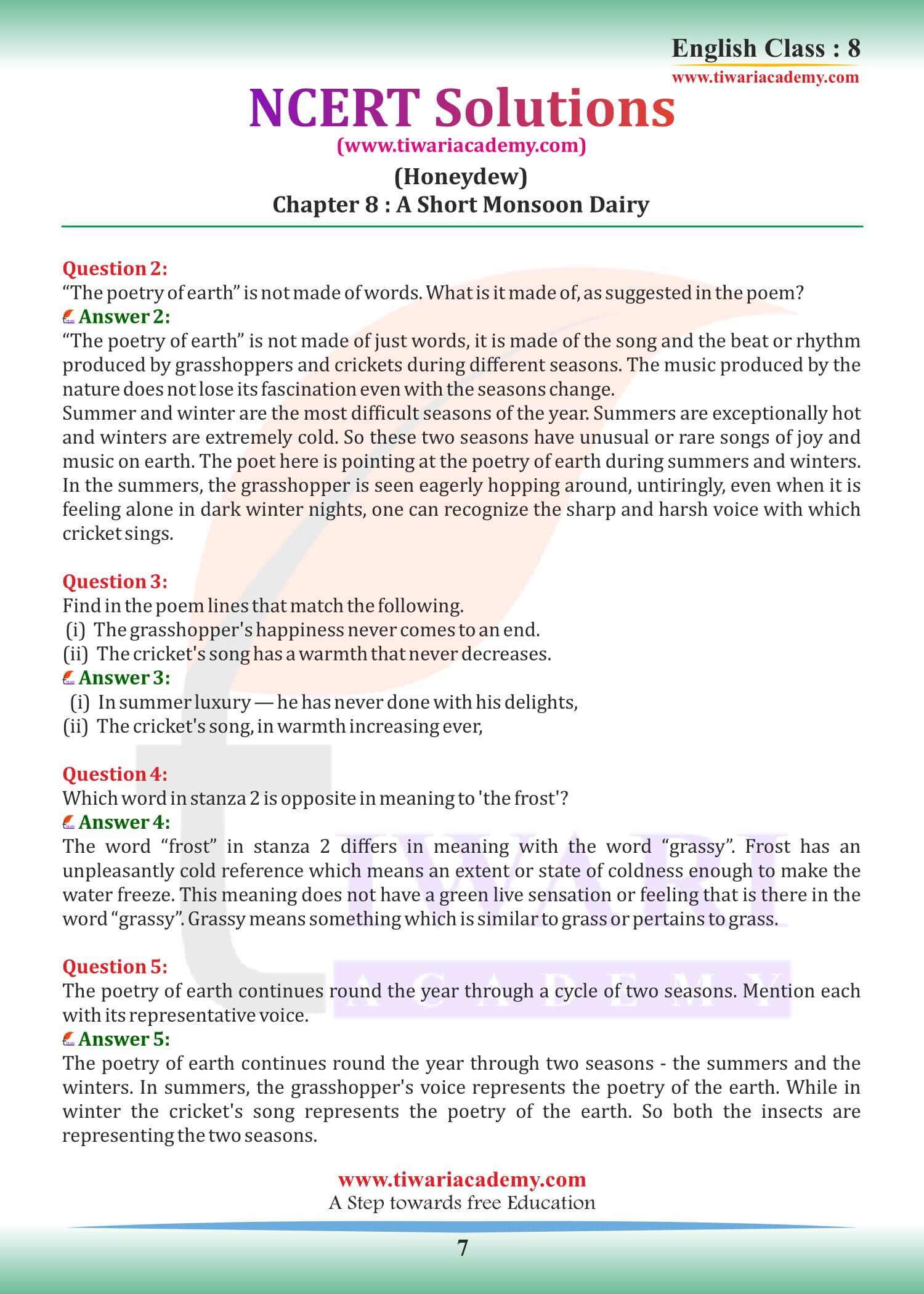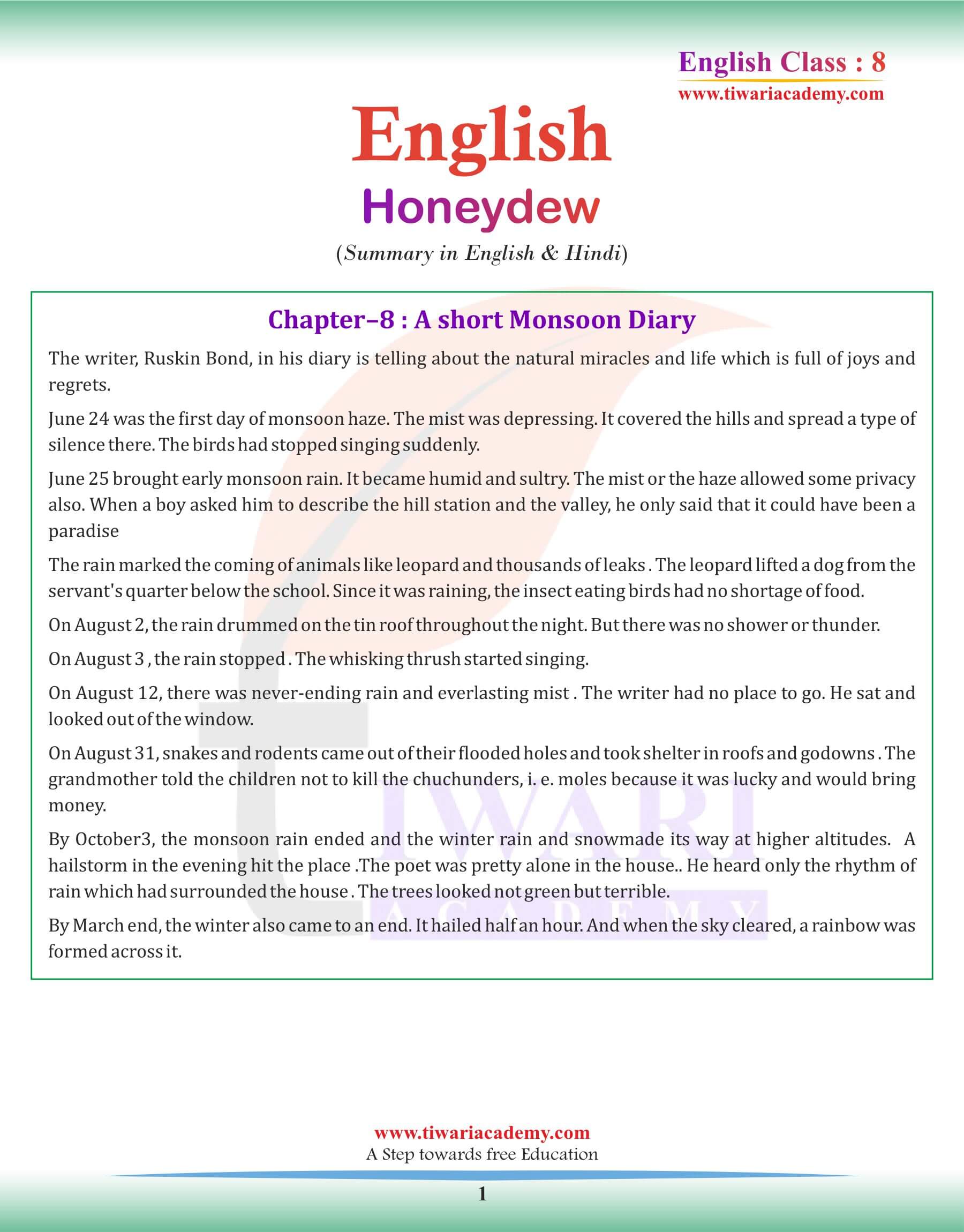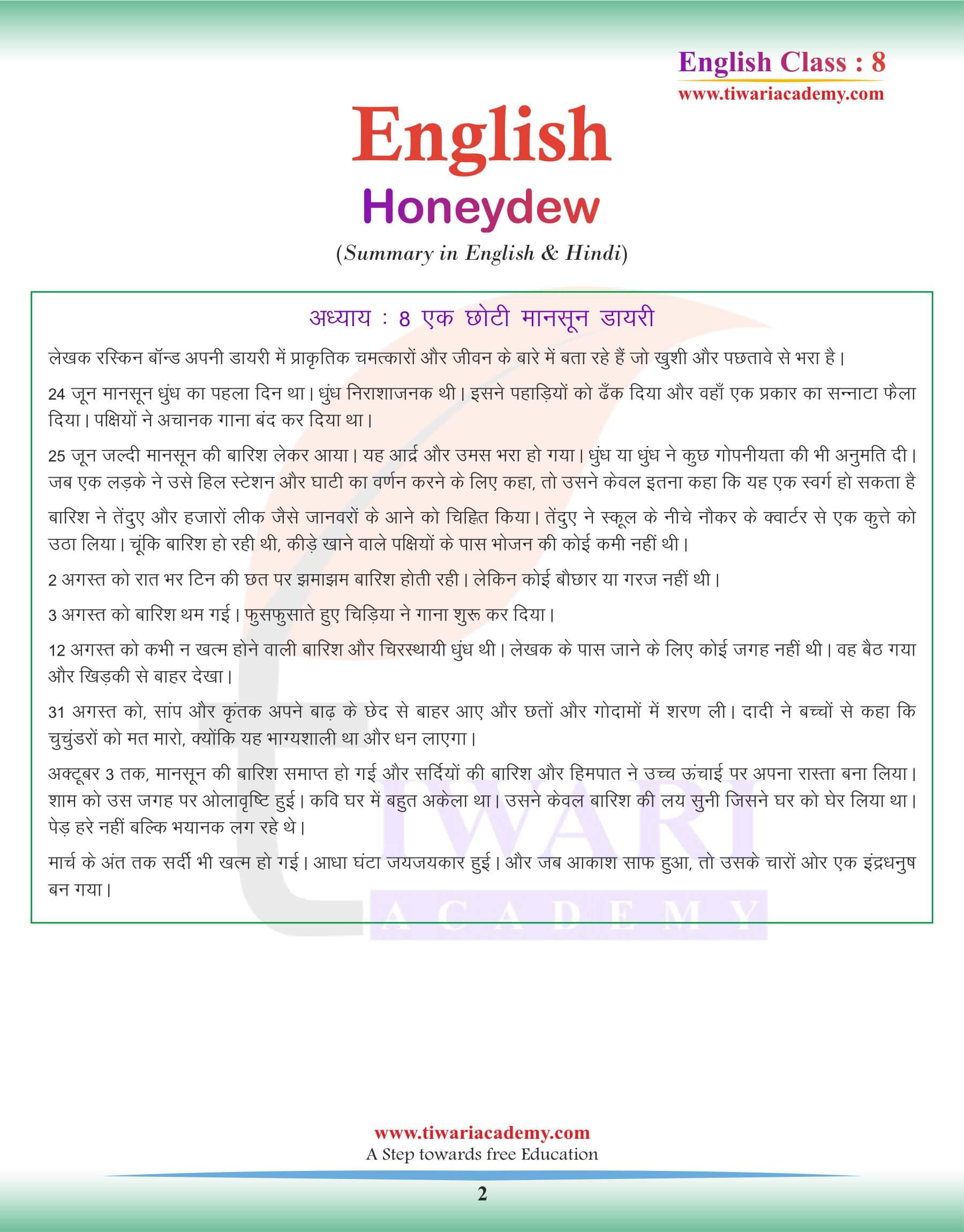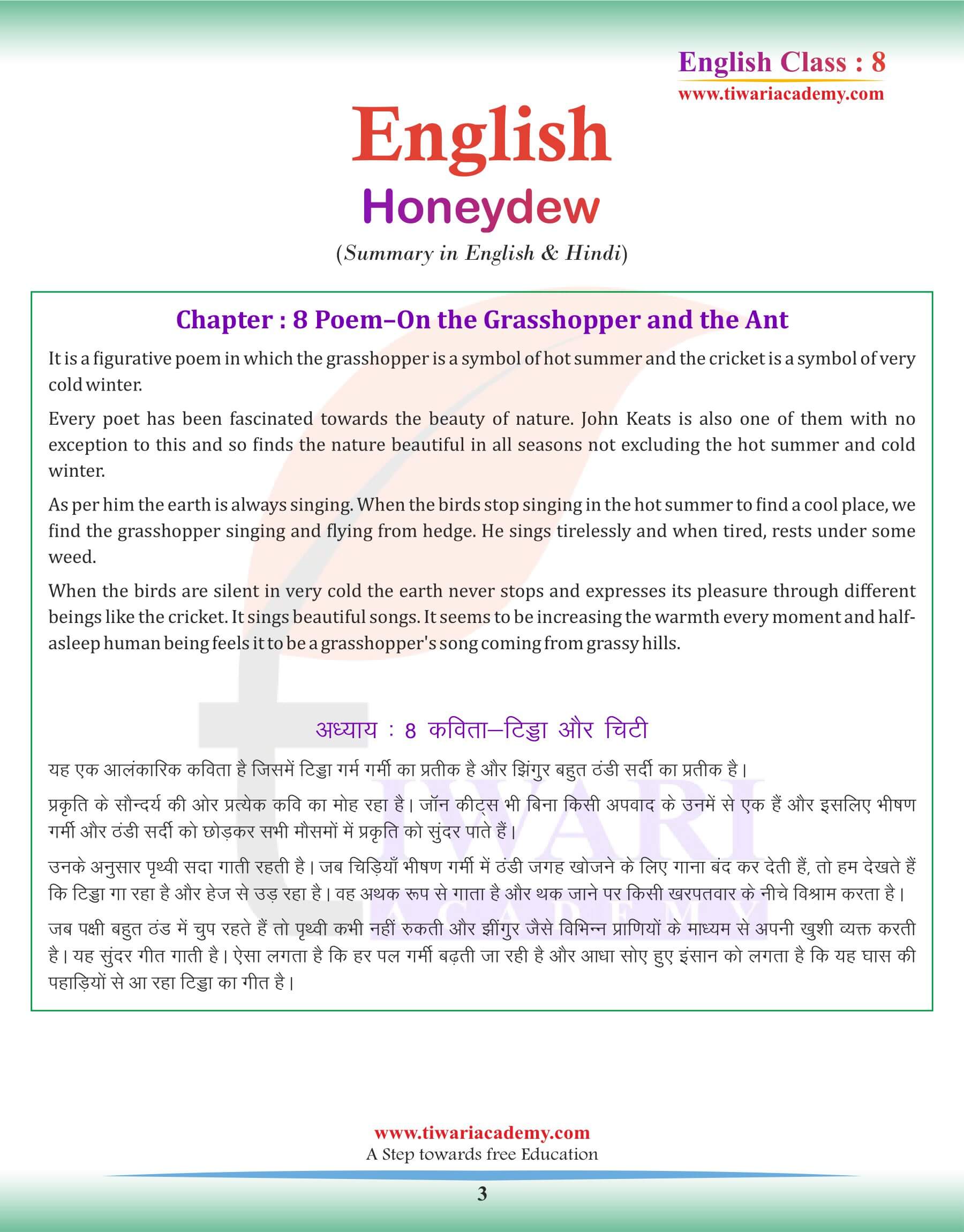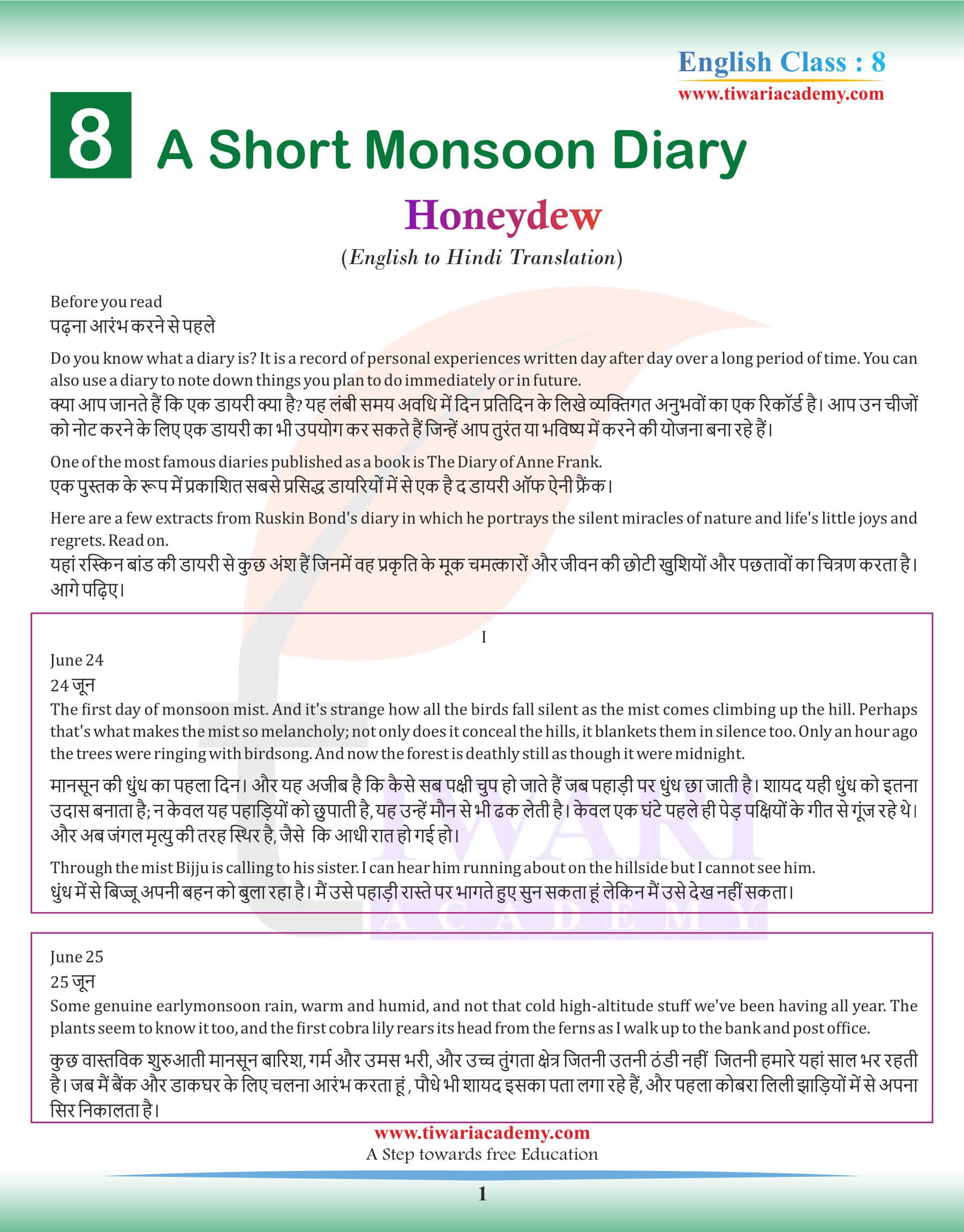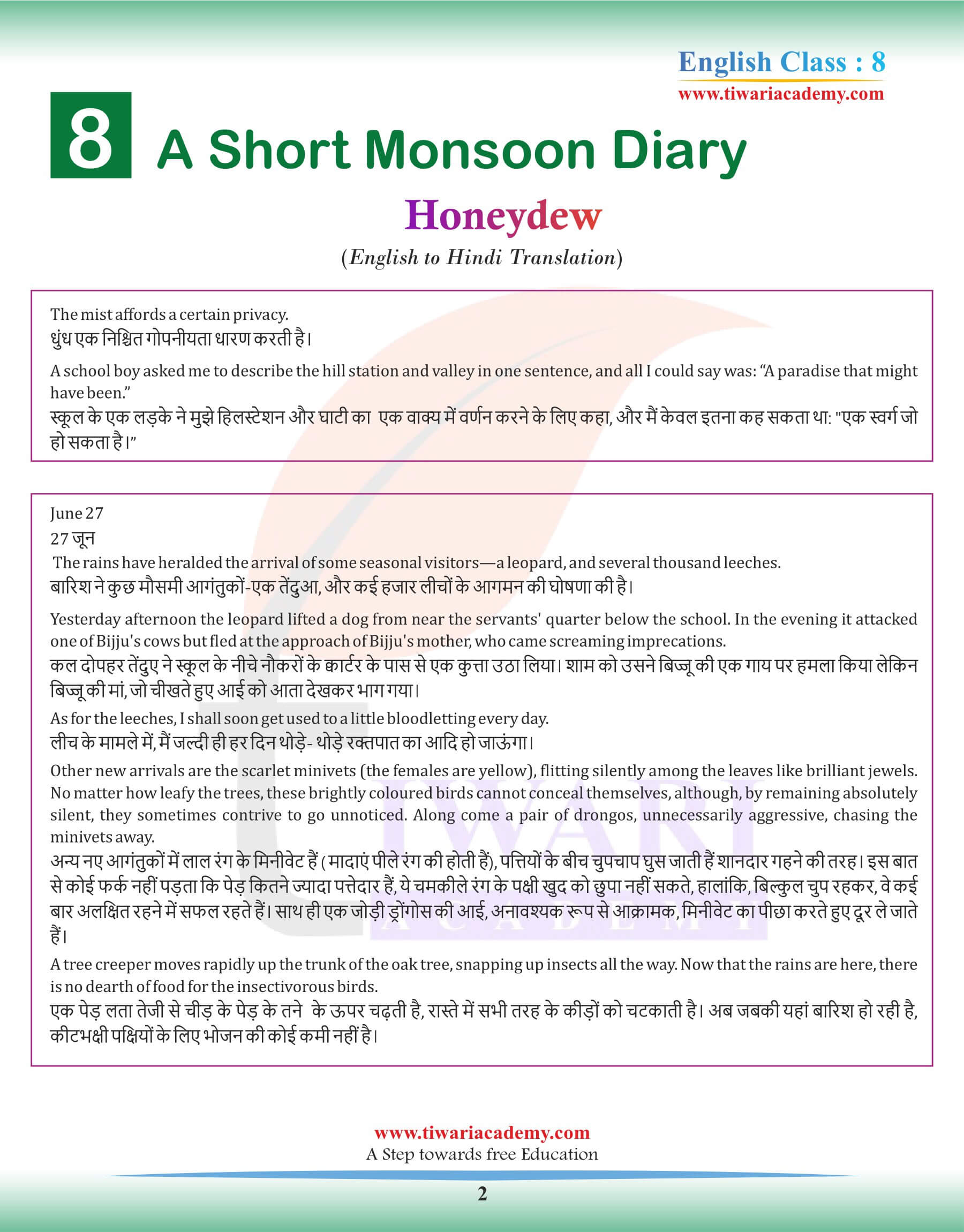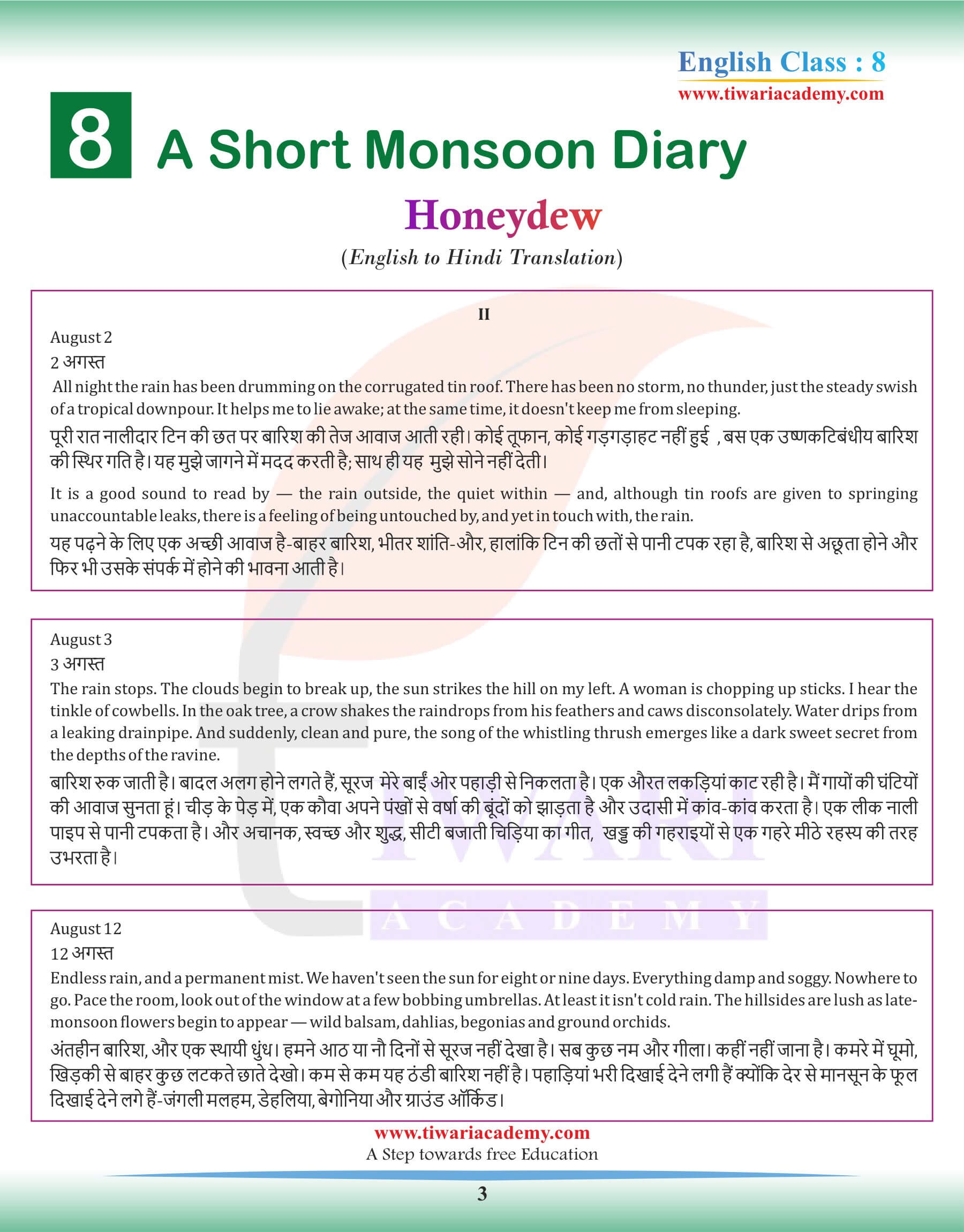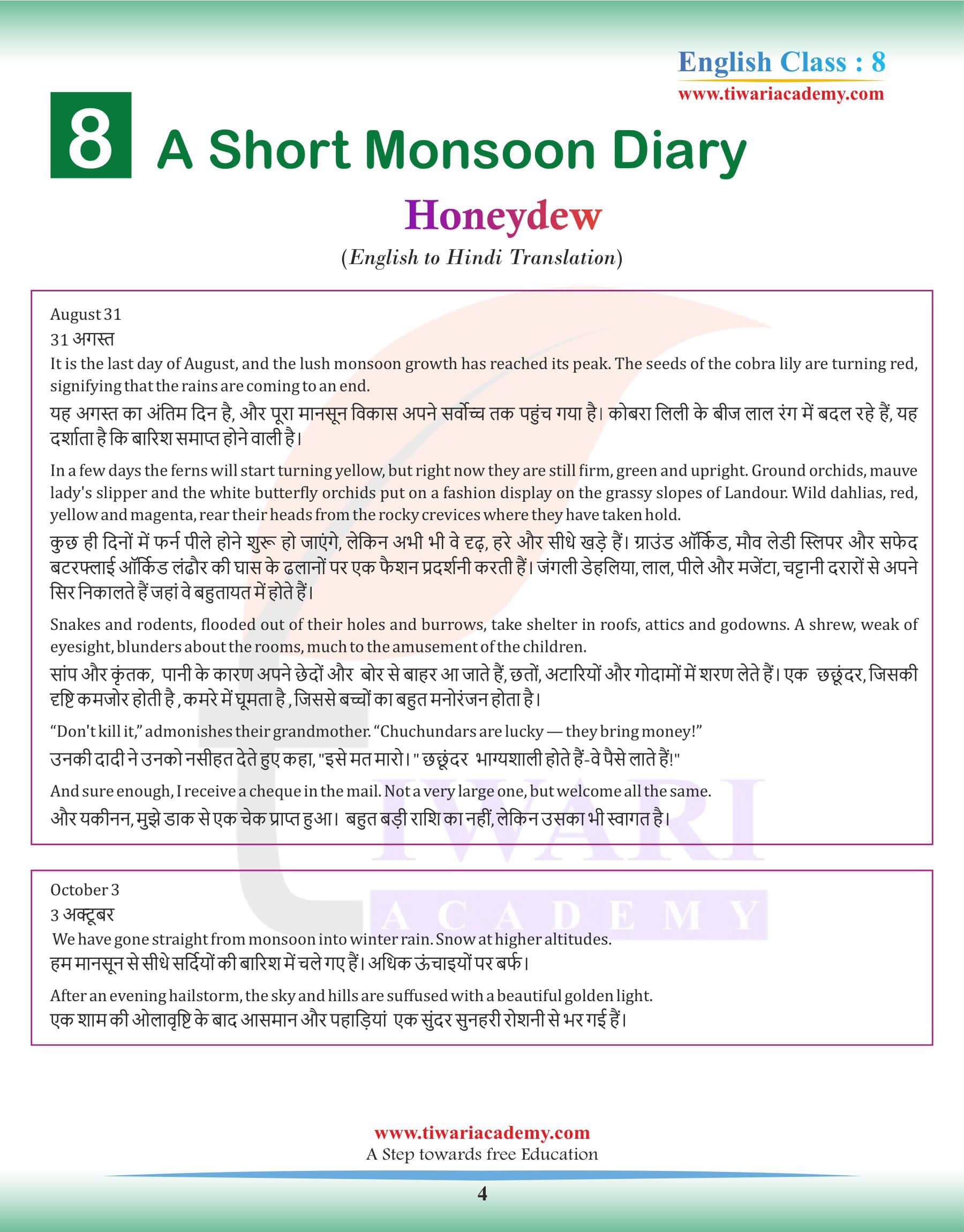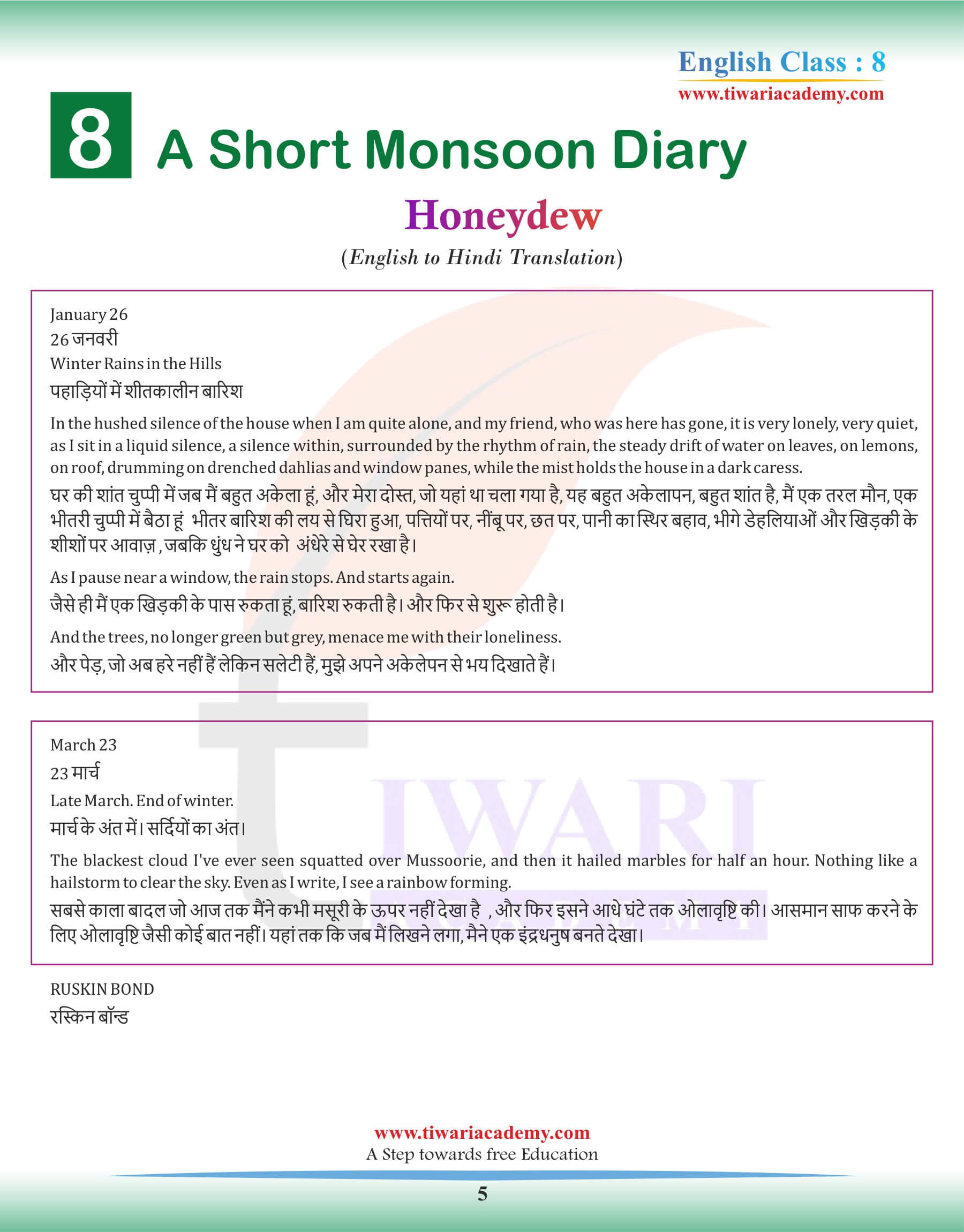NCERT Solutions for Class 8 English Honeydew Chapter 8 A Short Monsoon Diary and Poem On the Grasshopper and Cricket with Hindi Translation revised for session 2025-26. Get here the Summary of the chapter and poem in Hindi and English. These solutions of grade 8 English Chapter 8 contains answers of all the questions of comprehension check, working with the text, working with language, Grammar section and working with the poem. The solutions is modified according to new textbooks issued by NCERT for academic year 2025-26 exams.
Class 8 English Honeydew Chapter 8 Question Answers
| Class: 8 | English |
| Textbook: | Honeydew (English Reader) |
| Chapter: 8 | A Short Monsoon Diary |
| Contents: | Question-Answers, Summary, Translation |
| Academic Session: | 2025-26 |
Comprehension Check on Page 111
The author could not see Bijju because of the haze that covered the hills. So he could hear Bijju’s voice but could not see him.
What are the two ways in which the hills appear to change when the mist comes up?
When the haze or the mist covers the hills, the hills seem to change. All the birds which are sitting on the hills become quiet when the mist comes and covers up the hill. When the mist comes, it conceals the hills and blankets them in silence also.
Comprehension Check on Page 113
When does the monsoon season begin and when does it end? How do you prepare to face the monsoon?
The monsoon enters India from the east and the south around the mid of May. Then, it reaches northern part of the country almost in the second week of June. The monsoon ends in September. We prepare ourselves by taking out our rain coats and umbrellas to be able to face the monsoon.
In this diary entry, the author describes the beauty of the lovely hill station named Mussoorie.
It rained for about eight to nine days without stopping. As everything was damp and soggy and there was no place to go, the author walked in his room and looked out of the window at a few bobbing umbrellas.
Where do the snakes and rodents take shelter? Why?
The snakes and rodents take shelter in roofs, attics and godowns so that they could to protect themselves from the rain water.
The author received a cheque in the mail.
Working with the Text
Look carefully at the diary entries for June 24-25, August 2 and March 23. Now write down the changes that happen as the rains progress from June to March.
June 24 is the first day of monsoon haze. The hills are covered by the mist. It covers the hills with silence. All the birds also become silent when the mist starts covering the hills. The forest is completely dark as if it is midnight.
The real monsoon shower comes on June 25. It is welcomed by the entire nature. It is humid and warm rain. The first cobra lily takes its head out from the ferns.
By August 2, the people had become tired of the monsoon. Although, there was no storm or thunder, just a firm tropical heavy shower still people remained in their houses and enjoyed the noise of raindrops touching their roofs. Snakes and rodents take protection in roofs, attics and godowns.
March 23 marks the end of winter. The sky was full of black clouds followed by heavy hail storms which made the sky clear. And a rainbow starts forming in the clear sky.
Why did the grandmother ask the children not to kill the Chuchundar?
The grandmother asked the children not to kill the Chuchundar because according to her chuchundars are lucky and they might bring money.
What signs do we find in Nature which show that the monsoons are about to end?
The signs that show that monsoons are about to end are that wild balsam, dahlias, begonias and ground orchids had begun to appear. The seeds of cobra lily had started turning red. All these were the signs to show that the monsoons are about to end.
Question 4
Complete the following sentences.
(i) Bijju is not seen but his voice is heard because __________________.
(ii) The writer describes the hill station and valley as __________________.
(iii) The leopard was successful in __________________ but had to flee when __________.
(iv) The minivets are easily noticed because __________________.
(v) It looks like a fashion display on the slopes when __________________.
(vi) During the monsoon season, snakes and rodents are found in roofs and attics because __________________.
Answer 4
(i) Bijju is not seen but his voice is heard because of the mist in the environment.
(ii) The writer describes the hill station and valley as a paradise that might have been.
(iii) The leopard was successful in attacking one of Bijju’s cows but had to flee when Bijju’s mother came screaming curses.
(iv) The minivets are easily noticed because of their bright colours.
(v) It looks like a fashion display on the slopes when ground orchids, mauve lady’s slipper and the white butterfly orchids bloom.
(vi) During the monsoon season, snakes and rodents are found in roofs and attics because they have been flooded out of their holes and burrows.
Question 5
“Although tin roofs are given to springing unaccountable leaks, there is a feeling of being untouched by, and yet in touch with, the rain”.
(i) Why has the writer used the word, “springing”?
(ii) How is the writer untouched by the rain?
(iii) How is the writer in touch with the rain at the same time?
Answer 5
(i) The word “springing” means “to widen or grow suddenly”. The writer says that tin roofs are likely to developing unexpected leaks.
(ii) The writer was physically untouched by the rain as the tin roof stopped the rain from leaking in.
(iii) The writer was in touch with the rain at the same time because he could feel the rain by listening to its thump sound on the grooved or corrugated tin roof.
Question 6
Mention a few things that can happen when there is endless rain for days together.
Answer 6
When there is endless rain for days together, everything becomes humid damp, mushy and waterlogged. It becomes difficult for anyone to go out. The hillsides are green as late monsoon flowers such as wild balsam, dahlias, begonias and ground orchids begin to appear.
Question 7
What is the significance of cobra lily in relation to the monsoon season, its beginning and end?
Answer 7
The onset of monsoon can be seen when the first cobra lily appears from the ferns. The offset of monsoon is signified when the seeds of the cobra lily turn red. That is the significance of cobra lily in relation to the monsoon season.
Working with Language
Question 2
Put the verbs in the brackets into their proper forms. The first one is done for you.
(i) We (get out) of the school bus. The bell (ring) and everyone (rush) to class.
(ii) The traffic (stop). Some people (sit) on the road and they (shout) slogans.
(iii) I (wear) my raincoat. It (rain) and people (get) wet.
(iv) She (see) a film. She (narrate) it to her friends who (listen) carefully.
(v) We (go) to the exhibition. Some people (buy) clothes while others (play) games.
(vi) The class (is) quiet. Some children (read) books and the rest (draw).
Answer 2
(i) We got out of the school bus. The bell was ringing and everyone was rushing to Class.
(ii) The traffic stopped. Some people were sitting on the road and they were shouting slogans.
(iii) I wore my raincoat. It was raining and people were getting wet.
(iv) She saw a film. She was narrating it to her friends who were listening carefully.
(v) We went to the exhibition. Some people were buying clothes while others were playing games.
(vi) The Class was quiet. Some children were reading books and the rest were drawing.
Question 3
Here are some words from the lesson which describe different kinds of sounds.
drum swish tinkle caw drip
(i) Match these words with their correct meanings.
(a) to fall in small drops
(b) to make a sound by hitting a surface repeatedly
(c) to move quickly through the air, making a soft sound
(d) harsh sound made by birds
(e) ringing sound (of a bell or breaking glass, etc.)
(ii) Now fill in the blanks using the correct form of the words given above.
(a) Ramesh ____________ on his desk in impatience.
(b) Rain water ____________ from the umbrella all over the carpet.
(c) The pony ____________ its tail.
(d) The _________________ of breaking glass woke me up.
(e) The ____________ of the raven disturbed the child’s sleep.
Answer 3
(i)
(a) to fall in small drops – drip
(b) to make a sound by hitting a surface repeatedly – drum
(c) to move quickly through the air, making a soft sound – swish
(d) harsh sound made by birds – caw
(e) ringing sound (of a bell or breaking glass, etc.) – tinkle
(ii)
(a) Ramesh drummed on his desk in impatience.
(b) Rain water dripped from the umbrella all over the carpet.
(c) The pony swished its tail.
(d) The tinkling of breaking glass woke me up.
(e) The cawing of the raven disturbed the child’s sleep.
Question 4
Complete each sentence below by using appropriate phrase from the ones given below.
sure enough colourful enough serious enough kind enough big enough
fair enough brave enough foolish enough anxious enough
(i) I saw thick black clouds in the sky. And ___________ ___________ it soon started raining heavily.
(ii) The blue umbrella was ___________ ___________ for the brother and sister.
(iii) The butterflies are ___________ ___________ to get noticed.
(iv) The lady was ___________ ___________ to chase the leopard.
(v) The boy was ___________ ___________ to call out to his sister.
(vi) The man was ___________ ___________ to offer help.
(vii) The victim’s injury was ___________ ___________ for him to get admitted in hospital.
(viii) That person was ___________ ___________ to repeat the same mistake again.
(ix) He told me he was sorry and he would compensate for the loss. I said, “___________ ___________”.
Answer 4
(i) I saw thick black clouds in the sky. And sure enough it started raining heavily.
(ii) The blue umbrella was big enough for the brother and sister.
(iii) The butterflies are colourful enough to get noticed.
(iv) The lady was brave enough to chase the leopard.
(v) The boy was anxious enough to call out to his sister.
(vi) The man was kind enough to offer help.
(vii) The victim’s injury was serious enough for him to get admitted in hospital.
(viii) That person was foolish enough to repeat the same mistake again.
(ix) He told me he was sorry and he would compensate for the loss. I said, “fair enough.”
Working with the Poem
Discuss with your partner the following definition of a poem. A poem is made of words arranged in a beautiful order. These words, when read aloud with feeling, have a music and meaning of their own.
Poem is believed to be an imaginative and a creative piece of work which has a speech as well as a song. It is generally lyrical and symbolic. It is a beautiful arrangement of words that add beauty and real meaning in a poem. Poems are apparently read out loud to feel the deep enthusiasm, passion and feeling with which they have been collected or composed.
The rhyming words used in a poem put different ideas or facts and thoughts and imagination of the poet in coordination. According to the Oxford Advanced Learner’s Dictionary, a poem is defined as a piece of writing in which the words are selected for their sound and the descriptions they suggest, not just for their apparent meanings. The words are put or placed in separate lines, usually with a repetitive rhythm, and often the lines rhyme in the last part.
“The poetry of earth” is not made of words. What is it made of, as suggested in the poem?
“The poetry of earth” is not made of just words, it is made of the song and the beat or rhythm produced by grasshoppers and crickets during different seasons. The music produced by the nature does not lose its fascination even with the seasons change.
Summer and winter are the most difficult seasons of the year. Summers are exceptionally hot and winters are extremely cold. So these two seasons have unusual or rare songs of joy and music on earth. The poet here is pointing at the poetry of earth during summers and winters. In the summers, the grasshopper is seen eagerly hopping around, untiringly, even when it is feeling alone in dark winter nights, one can recognize the sharp and harsh voice with which cricket sings.
Find in the poem lines that match the following. (i) The grasshopper’s happiness never comes to an end. (ii) The cricket’s song has a warmth that never decreases.
(i) In summer luxury — he has never done with his delights,
(ii) The cricket’s song, in warmth increasing ever,
Which word in stanza 2 is opposite in meaning to “the frost”?
The word “frost” in stanza 2 differs in meaning with the word “grassy”. Frost has an unpleasantly cold reference which means an extent or state of coldness enough to make the water freeze. This meaning does not have a green live sensation or feeling that is there in the word “grassy”. Grassy means something which is similar to grass or pertains to grass.
The poetry of earth continues round the year through a cycle of two seasons. Mention each with its representative voice.
The poetry of earth continues round the year through two seasons – the summers and the winters. In summers, the grasshopper’s voice represents the poetry of the earth. While in winter the cricket’s song represents the poetry of the earth. So both the insects are representing the two seasons.
What did you understand by reading pages from the diary of Ruskin Bond? Unit 8 chapter 1 from class 8th Honeydew.
After reading the pages from the Journal of Ruskin Bond. I noticed he used to notice the atmosphere that we are failed to notice. Even the raindrops and the silence of birds in a mountain and the silence.
What do you understand about Ruskin Bond after reading the pages from his Diary? Unit 8 chapter 1 from class 8th honeydew.
I think I understand after reading the pages from his journal that He was one of the great writers who see the world and surrounding with their different perceptive. Which makes them know how to successfully to drew in words so that all the readers can enjoy it too.
Do you find the story was fun? Unit 8 chapter 1 from class 8th honeydew.
I think this page from the diary is a different genre of reading unlike fictional stories it is not and it is not biography but a Journal which makes the readers see from the perceptive of the author.
In the poem, the Grasshopper is shown as the leader how? Unit 8 chapter 2 from class 8th honeydew.
In the poem of the earth when all the birds are tired due to summer heat, they find the shadow of a tree but the grasshopper is the only one who still plays its noise outside. That’s why the poet in this poem called it the leader to summer.
Why do you think the poet called it a poem of the earth is never dead? Unit 8 chapter 2 from class 8th honeydew.
I think the poet calls the circles of seasons change is a poem as he considers it as poetic. Also, he considers that it will never be over even after him it will remain like this.
